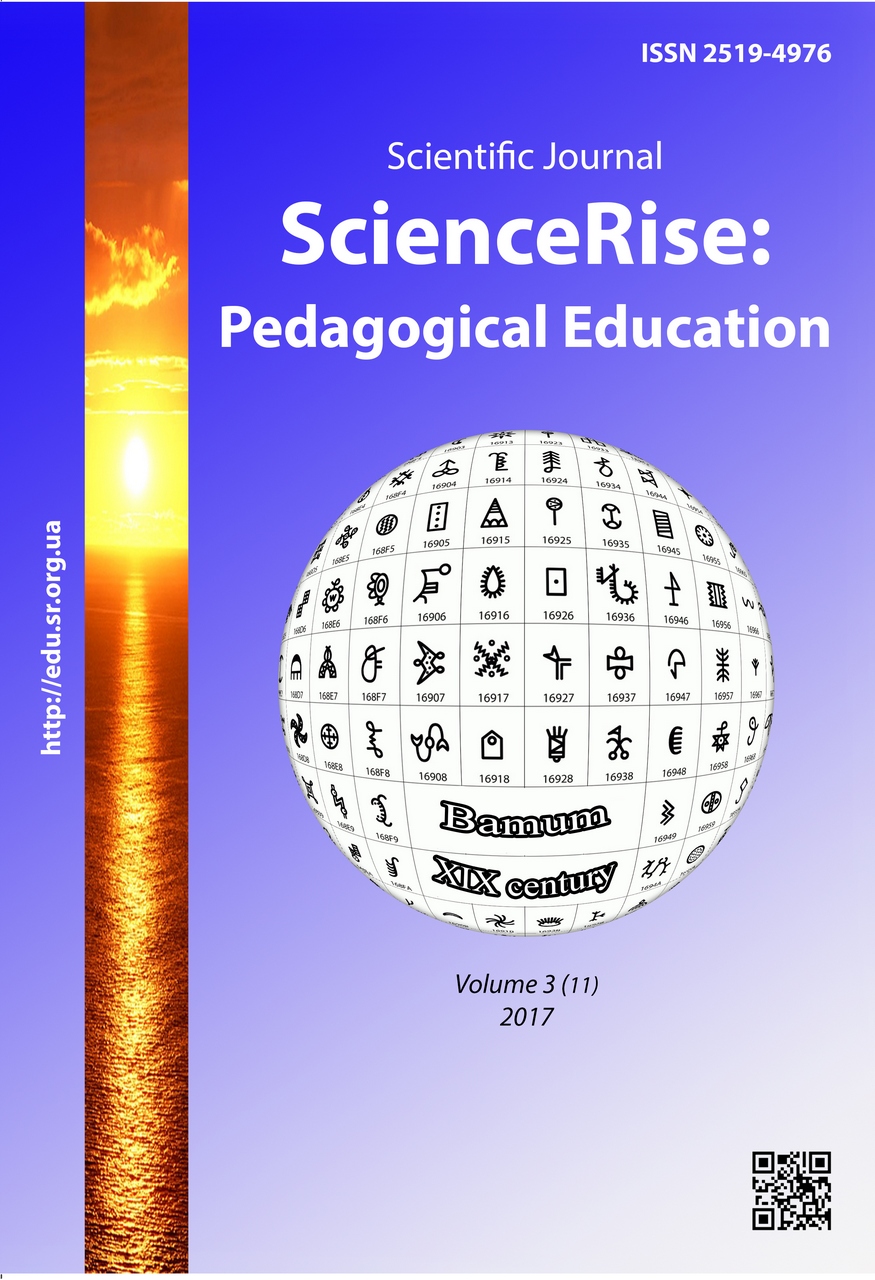Analysis of program implementation of stages of experimental work on formation of professional tolerance in future teacher of music art
DOI:
https://doi.org/10.15587/2519-4984.2017.96966Keywords:
professional tolerance, musical art, stages of experiment, hermeneutic skills, professional trainingAbstract
In the study was analyzed psychological-pedagogical aspect of the phenomenon “professional tolerance”, concentrated on experimental work, realized in three stages: procedural, projective-constructive, organizational-active under conditions of real learning process. It was accented, that at each stage were used the pedagogical techniques and methods that in certain way added or doubled each other for realization of separated pedagogical conditions for successful formation of professional tolerance in future teacher of musical art.
The program of organizational-active stage of pedagogical experiment on formation of professional tolerance in future teacher of musical art is directed on experimental learning, realized under natural conditions and provided the solution of following tasks:
1) to determine the possibilities of teaching-methodological materials in formation of professional tolerance;
2) to study the features of educational environment that positively or negatively influence the formation of this complicated personal phenomenon during the study of professional subjects;
3) to verify the effectiveness of methodology of organization and realization of forming stage of experiment at observance of the totality of pedagogical conditions;
4) to realize the experimental program of formation of professional tolerance in future teacher of musical art.
In the article was outlined and grounded the use of hermeneutic skills in the process of music-interpretational activity, based on the principles of cognitivism, euristicity, development of activity of formation of future teacher of musical art, dialogue between students and teacher. The attention was accented on the dynamic of hermeneutic skills formation, including the series of methods, namely: integral analysis-interpretation of musical compositions, critical and comparative analysis of them
References
- Skok, A. G. (2007). Socio-psychological conditions of formation of communicative tolerance in the university teacher. Kyiv, 194.
- Irkhina, Y. V. (2011). Formation of professional tolerance future high school teachers. Odessa, 20.
- Lisun, D. V. (2010). The essential characteristic structure and hermeneutic professional skills of future musicians. Naukovi zapysky. Seriya: Pedahohika, 1, 68–74.
- Pometun, O. I., Pyrozhenko, L. V.; Pometun, O. I. (Ed.) (2004). Current lesson. Interactive learning technologies. Kyiv: A.S.K., 192.
- Poluboyarynova, I. I. (2013). The problem of interpretation of a musical work in the musical training of gifted students. Education and development of gifted person, 1 (8), 70–73.
- Lyashenko, O. D. (2011). Artistic interpretation of works of art in the theory and practice of scientific analysis. Neperervna profesiyna osvita: teoriya i praktyka, 2, 58–63.
- Alekseeva, E. V., Bratchenko, S. L. (2003). Psychological Principles of tolerance teacher. Monologues about teachers. Saint Petersburg: SPbAPPO, 165–172.
- Ivanov, I. P. (1989). Encyclopedia collective creative affairs. Moscow: Pedagogy, 207.
- Mazur, T. G. (1996). Humanization of relations in the educational process. Elementary School, 9, 5–6.
- Moskalenko, V. G. (1994). Creative aspect of musical interpretation. Kyiv: Music Ukraine, 205.
Downloads
Published
How to Cite
Issue
Section
License
Copyright (c) 2017 Zoya Stukalenko

This work is licensed under a Creative Commons Attribution 4.0 International License.
Our journal abides by the Creative Commons CC BY copyright rights and permissions for open access journals.
Authors, who are published in this journal, agree to the following conditions:
1. The authors reserve the right to authorship of the work and pass the first publication right of this work to the journal under the terms of a Creative Commons CC BY, which allows others to freely distribute the published research with the obligatory reference to the authors of the original work and the first publication of the work in this journal.
2. The authors have the right to conclude separate supplement agreements that relate to non-exclusive work distribution in the form in which it has been published by the journal (for example, to upload the work to the online storage of the journal or publish it as part of a monograph), provided that the reference to the first publication of the work in this journal is included.







